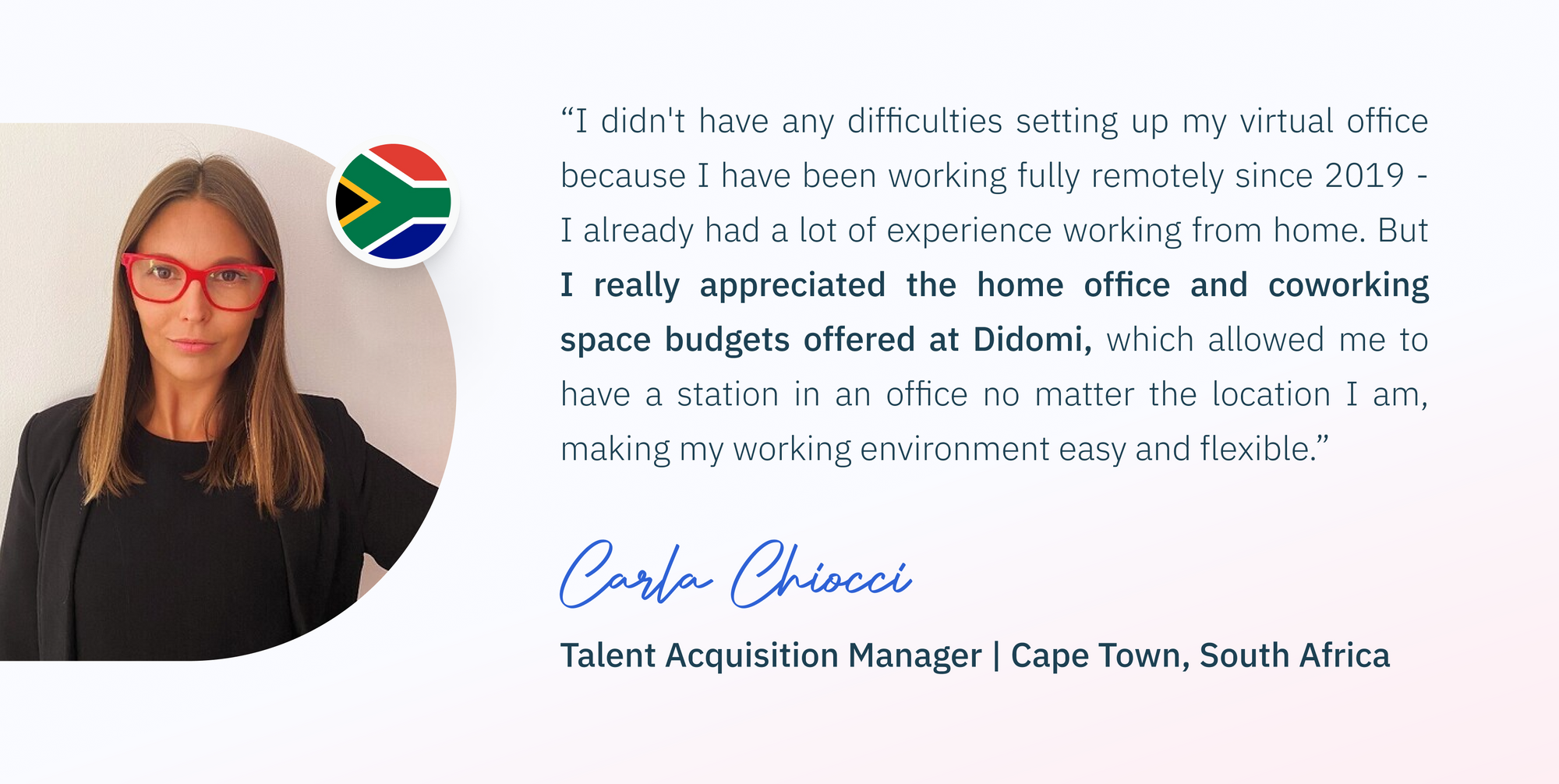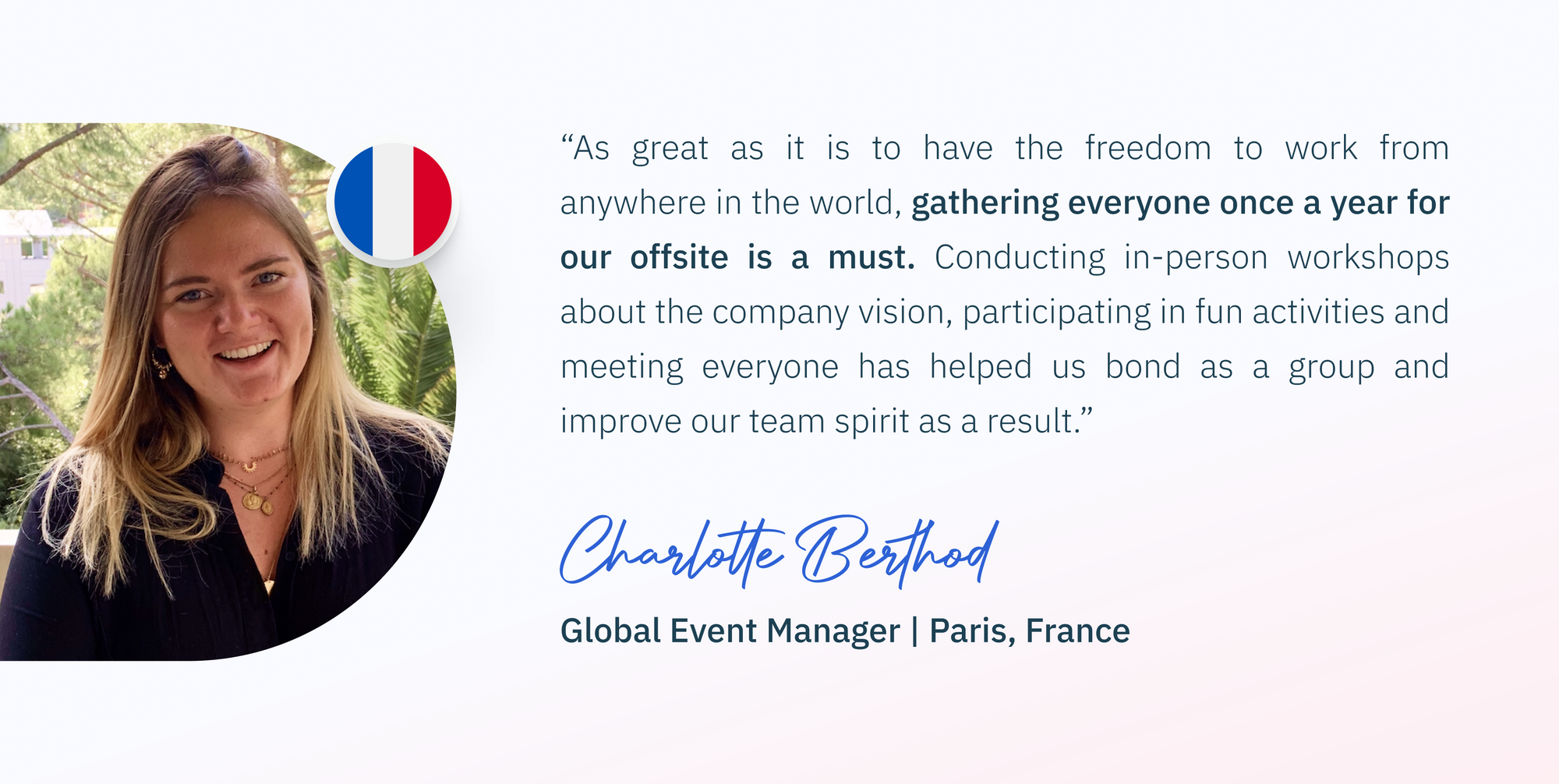Remote work has seen an incredible rise over the last couple of years, accelerated by the COVID-19 pandemic and the various stay-at-home mandates around the world, as well as a general trend led by tech companies - where the practice was already semi-established.
At Didomi, remote work is nothing new: The company has been remote-first since its inception, and the company co-founders Romain Gauthier, Jawad Stouli, and Raphaël Boukris respectively work from La Rochelle, New York, and Paris.
Reflecting on the last few years and how Didomi grew to a 120+ employee headcount with a third of its workforce working fully remotely, we want to share our learnings and offer a space for some of our collaborators to talk about their experience.
Summary:
- The state of remote work in 2023
- Remote work at Didomi: How we do it
- How to successfully build a remote-first company? 6 tips for a successful remote-first strategy
The state of remote work in 2023
Beyond a simple work practice, remote work forces us to rethink our relationship to work, pay more attention to work-life balance, and reevaluate our use of corporate workspace, with hybrid work becoming the new standard for a lot of leading companies.
The 2020 COVID-19 pandemic has impacted the way we work in a lot of ways, including remote work. While remote work started for many as a necessity due to stay-at-home mandates and social distancing measures, it now seems to have become much more common in 2023.
This trend was largely accelerated by the 2020 COVID-19 pandemic, social distancing measures, and stay-at-home mandates that were implemented around the world. Indeed, studies have shown that prior to COVID-19, 85% of employees in Europe had never worked from home in 2019, while nearly half started working remotely full-time during the pandemic.
This change had deep implications for employers and employees alike. While the general trend has slowed down (as of 2023 and according to an Owl Labs study, 16% of companies in the world are 100% remote, and 44% of companies don’t allow remote work), the impact on employee satisfaction and productivity is unprecedented.
Some interesting remote work statistics for 2023 include:
- By 2028, it’s predicted that 73% of all teams will include remote employees (source: Upwork)
- 86% of workers said being able to work from home - at least some of the time - would make them happier (source: Owl Labs)
- A study showed that 34% of in-office employees surveyed reported that interruptions from colleagues affected their productivity, compared to only 16% of remote workers surveyed (source: Alto)
- Remote workers save around $7,000 per year in transportation, food, and childcare (source: TECLA)
On top of that, we can also see that the ability to work remotely has increasingly become a requirement for a lot of job seekers, and a strong selling point for companies to attract top prospects.
Indeed, 64% of recruiters report that a work-from-home policy helps them recruit high-quality talent. On the other side of the fence, a ZipRecruiter report showed that 60% of job seekers surveyed said that they hope to find remote opportunities. Of these, 20% say they will only consider remote work opportunities, and about 40% argue they would prefer to work remotely most of the time, even though they are open to accepting other arrangements.
In conclusion, and even though the jury is still out about the pros and cons of remote work, organizations can’t ignore this shift in the market and must get ready to accommodate existing and future employees as the work landscape evolves.
Remote work at Didomi: How we do it
At Didomi, we help our customers comply with regulatory obligations, including the European Data Protection Regulation (GDPR), and build a relationship of trust with their customers regarding personal data.
Large groups such as Orange, Société Générale, Harrods, and many others rely on us to carry out this important mission.
One of the main values at Didomi has always been Trust. Our Privacy Suite provides clients with the tools to build a relationship of trust with their customers, giving back to users control over their data - and complying with regulations in the process.
As a core value, trust is also a key element of how we work internally at Didomi. A third of our employees are working fully remotely, with the rest of the workforce working mostly in a hybrid setting, both remotely and from one of our offices. This ability to work remotely has historically been one of the pillars of employee satisfaction at Didomi.
With over 120 employees in 20 countries, covering over 28 nationalities, it is essential to provide the necessary tools and resources for everyone to work together efficiently. At Didomi, it comes through 3 main axes:
- Budget for hybrid and fully-remote employees
- Remote tools
- Fostering social interaction in a fully-remote setting
Let’s take a look at each.
Budget for remote employees
A home office equipment budget is offered to remote employees (fully and hybrid) so they can build their ideal workstation at home, and have everything they need to work properly: office chair, screen, headset, mouse, monitors, internet, and electricity bills stipend, etc
Employees are also offered to subscribe to a coworking space if they want to - plenty of Didomians choose to do so in order to step out of their homes, socialize with other remote workers, and create a clearer work-life balance.

Remote tools and stack
Social interaction is also a very important aspect of work and an often overlooked pain for remote workers. Face-to-face relationships have been replaced by virtual meetings, which require some effort and sometimes a lot of getting used to. Quick chats during coffee breaks at the office might appear trivial - until you can’t have them anymore.
To successfully adjust, it is necessary to provide new avenues of communication - with the necessary tools to foster these exchanges. At Didomi, employees can communicate seamlessly using the professional instant messaging platform Slack, and have access to a wealth of professional software to chat, collaborate, create, receive feedback, and more.

Fostering social interaction in a fully-remote setting
To maintain a united and motivated team, it is essential to build and maintain cohesion among employees. This is why, once a year, an offsite event is organized, gathering all employees from the four corners of the world in one place.
As a remote-first company, meeting once a year is a special time to reflect, meet and celebrate our achievements. Last year, the event was organized next to Paris and was a great success: the team was able to gather around fun team-building activities and create new memories together - in person.

How to successfully build a remote-first company? 6 tips for a successful remote-first strategy
Based on our experience at Didomi after several years of running a remote-first company, here are 5 tips businesses can implement for a successful remote-first strategy.
1) Ensure a legal framework and drive innovative solutions
The very first step is of course to ensure compliance with legal requirements.
In many countries (such as France, where Didomi is headquartered) remote work has to be defined and regulated within a company agreement. In order to hire international talents abroad or to help relocate employees, companies can either work with their internal legal department (in the case of large enterprises and corporations), or leverage employer of record (EOR) solutions.
These global employment services providers help businesses hire people legally in other countries, and ensure compliance with local legislation on immigration, social security, taxation for the company and the employee, payroll, local labor law, and so on.
2) Provide a suitable working environment
Ensuring a healthy and effective remote work culture requires providing employees with the best possible working conditions.
This implies providing them with the right equipment according to their needs (as shown previously in the budget section for example), but you should also ensure that they get access to all the help and information they need:
- Implementing a 24/7 IT support service that employees can contact in case of technical issues.
- Creating an intranet or resource hub where all the resources and information are accessible and easy to find for all collaborators.
Of course, it will also be important to set up a corporate social network to facilitate exchanges and internal communication, as well as an instant messaging platform such as Slack, Microsoft Teams, or Discord.
3) Trust your team
At the very core of the concept of remote work lies the idea of trust. Micro-managing is not an option and each collaborator should feel empowered to handle their tasks and responsibilities independently - and of course to reach out whenever they need.
While providing this new level of freedom might be challenging for some companies, it is paramount for the success of a remote-first approach. Employee empowerment is one of the main keys to a company's success, and often the most important to enable successful collaboration and performance.
4) Humanize your team rituals
Loneliness is one of the biggest challenges your teams may face when working remotely, as reported in Remote Tools' report "The State of Telework in 2020".
Setting up daily, weekly, and monthly rituals will prove invaluable in keeping your team socially connected, whether it's for casual talks or work-related discussions.
5) Nurture motivation and commitment
Nearly 80% of the remote workers surveyed in this study conducted by Malakoff Humanis said that working from home has strengthened their motivation and commitment to their company.
There is nothing better than clear objectives to prevent your team from feeling disconnected. By giving an overview of where the company is headed and what projects are being worked on, you’ll allow employees to see the scale of their daily tasks. Open up strategic meetings, encourage workshops, and involve collaborators as much as possible to nurture that feeling.
6) Create fun and positive moments
Finally, while productivity and results are very important, you shouldn’t forget that work is a human experience first. Make sure to encourage and promote social initiatives within your team.
From virtual coffees matching random employees together once a week (we’ve done this for years at Didomi) to virtual sports classes, shared lunches, and more, virtual events are an excellent way to maintain the social link within your team in a context that can be quite isolating and lonely at times.
We hope that these tips have been helpful. If you’re interested in finding a fully remote position, Didomi is actively hiring across all departments, from product to tech, marketing, and sales.
Browse our job openings and get in touch:








